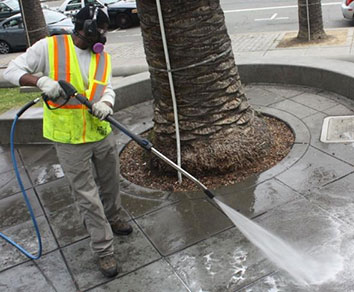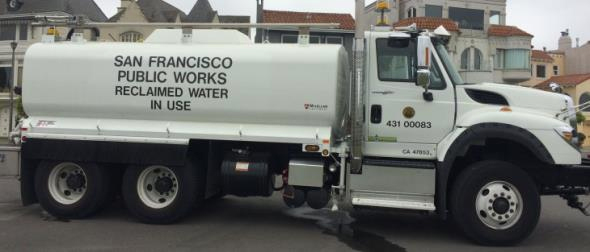Prevent Water Waste
To report water waste, please visit https://sf311.org. For questions about water conservation, please leave a message at 415-551-4730 or email waterconservation@sfwater.org.
Learn more about efficient water use in our city.
Frequently Asked Questions
-
1. What are our current water supply conditions?
Water is precious in California. Rain or shine, there is never enough water to waste. For current information about the SFPUC's water supply conditions, see our weekly reservoir storage and precipitation level updates.
-
2. What wasteful water use restrictions are in effect?
The following prohibitions against wasteful water use as specified in Section E, Rule 12 of the SFPUC’s Rules and Regulations Governing Water Service to Customers remain in effect rain or shine and are permanent:
- Application of potable water to outdoor landscapes in a manner that causes runoff such that water flows onto adjacent property, non-irrigated areas, private and public walkways, roadways, or parking lots or structures
- Use of hoses for any purpose without an automatic shut-off valve
- Use of potable water to wash sidewalks, driveways, plazas and other outdoor hardscapes for reasons other than health, safety, or to meet City of San Francisco standards for sidewalk cleanliness in a manner that causes runoff to storm drains and sewer catch basins. In addition, San Francisco sewer requirements prohibit discharge of water containing pollutants or grease or water from sources other than rain to storm drains and catch basins.
- Use of single pass cooling systems, fountains and decorative water features, and commercial car washes
- Application of potable water to outdoor landscapes during and within 48 hours after measurable rainfall
- Irrigation with potable water of ornamental turf on public street medians
- Use of potable water for backfill consolidation around non-potable piping, soil compaction, or dust control for construction or demolition projects if recycled water, well water, or groundwater are available
- Serving drinking water other than upon request at eating or drinking establishments, including restaurants, hotels, cafes, cafeterias, bars or other public places where food or drink are served
- To promote conservation, hotels and motels shall provide guests with the option of choosing not to have towels and linens laundered daily and display notice of this option in guestrooms
- Homeowners’ associations and community service organizations are prohibited from taking or threatening action against any owner for reducing or eliminating irrigation during drought, or requiring any owner to remove installed water-efficient landscaping measures once a drought ends.
- Using potable water to irrigate non-functional (ornamental) turf on commercial, industrial, and institutional properties, including non-functional turf in common areas owned by homeowners’ associations (HOAs). The ban does not apply to private yards or gardens maintained by individual homeowners and residents, and it does not restrict watering trees or watering turf used for recreational purposes. For more details, see the State Water Board’s regulations: Water Conservation Emergency Regulation Frequently Asked Questions
-
3. How can I maintain efficient water use?
Take advantage of our free Water-Wise Evaluations and free efficient devices. Whether you rent or own, pay your own water bill, or use water in a home, apartment, business, or other type of facility, there are plenty of ways to avoid waste and ensure your water use is efficient. Learn how with Conservation Tips for Residents or Conservation Tips for Businesses.
-
4. How can I check if my home or business is wasting water through leaks?
Visit sfpuc.gov/fixleaks for tips and a guidebook on how to identify and repair common leaks including toilets, faucets, showerheads, and irrigation systems. Select standard toilet repair parts are provided free from the SFPUC.
Register for or log in to My Account to view your household’s daily and hourly water use reports. Sudden unexplained increases in water use could mean a plumbing or irrigation system leak has developed or some other unusual water use is occurring.
-
5. What should I do if I see water waste occurring?
We encourage you to talk with your neighbors and the establishments you frequent to let them know about the importance of conserving water and water-saving assistance available through the SFPUC. You may also report a potential violation of water waste restrictions by submitting an online complaint through sf.gov/topics/311-online-services or by calling 3-1-1.
The SFPUC responds to these reports. It is important to note that not all visible water use is wasteful or means that a home or building’s overall water use is inefficient.
-
6. Can businesses and apartment buildings clean their sidewalks and plazas with water?
Using water to wash sidewalks and hardscapes should be limited to address health and safety needs and to meet City of San Francisco standards for sidewalk cleanliness. Brooms and other non-water using equipment should be used for general maintenance purposes. If washing with water is necessary, spot wash the areas of immediate need with a wet mop, a pressure washer, or a hose equipped with a water-efficient spray nozzle and stop before runoff to sewer and storm drains occurs. SFPUC provides free automatic shut-off nozzles.
-
7. Can pressure washing be performed in San Francisco?
Pressure or power washing is allowed to address health and safety needs, for cleaning the sides and windows of buildings, or for meeting City of San Francisco standards for sidewalk cleanliness as long as it is done efficiently and without causing runoff to the sewers or storm drains. Any use of water that causes runoff into storm drains or catch basins is prohibited. Mobile washers should obtain a mobile washer permit from the SFPUC to ensure they are following best practices to avoid water waste and pollutant discharge.
-
8. What are the best ways to clean sidewalks?
Brooms and non-water using methods should be used as much as possible, following the guidelines below. Violations may occur if water is used inefficiently. Per wastewater regulations, water runoff from hardscape washing, as well as disposal of trash, debris, hazardous and other materials into storm drains or catch basins is never allowed and could result in further penalties. Download Sidewalk Cleaning Tips Here.
- Pick up or sweep up waste materials, trash, food and debris and dispose of it in trash bins.
- Use liners in compost and trash bins to avoid needing to rinse bins with water.
- Use water sparingly to spot wash areas where substances have accumulated. The most efficient methods are a wet mop or a pressure washer with a maximum flow rate of 1.6 gallons per minute. If a hose is used, it must be equipped with an automatic shut-off nozzle.
- Never use water to push debris into the street, gutter, storm drains or neighboring properties.
- Never run water continuously.
- >Never wash restaurant floor mats and equipment on sidewalks or in alleys. All food establishment equipment must be washed in facilities with grease traps.
- Obtain a mobile washer permit from the SFPUC if you are or use a mobile washer business.
-
9. Are City trucks and workers allowed to clean City streets and sidewalks?

A city worker removing waste for health and safety purposes. Yes. The Department of Public Works (DPW) cleans streets for public health and safety purposes and responds to 311 service requests for removal of human and animal waste on sidewalks and plazas. DPW employees, wearing yellow DPW vests and protective gear, use low-flow pressure washing equipment with disinfectant to spot clean public areas where health and safety situations have been identified.
DPW’s larger street cleaning vehicles, known as flusher trucks, use recycled water for a portion of their work. In addition, SFPUC wastewater maintenance trucks use recycled water for sewer flushing.

A city vehicle using reclaimed water to flush sewers. DPW’s larger street cleaning vehicles, known as flusher trucks, use recycled water for a portion of their work. In addition, SFPUC wastewater maintenance trucks use recycled water for sewer flushing.
-
10. What is the most efficient way to water lawns and gardens?
When watering your lawns and gardens, it is required that no runoff onto sidewalks, hardscapes, or storm drains occurs and that potable water is not used within 48 hours after a rain event. For a typical San Francisco property, watering once or twice a week may be sufficient. For lawn and other plantings on steeply sloped areas, watering should be done in multiple start times to avoid runoff. For example, if you normally water for 10 minutes, adjust the schedule to water for 5 minutes, wait for an hour, and then water again for another 5 minutes. This allows the area to absorb the water before it begins running off. Download Efficient Watering Tips Here.
Consider long-term changes to your garden that will result in less water use, such as replacing grass or high-water use plants with drought-tolerant species or converting to drip irrigation. The SFPUC provides many resources and incentives, including a free Water-Wise Gardening for San Francisco guidebook.
-
11. Can restaurants serve water to customers?
Yes, but it should be upon customer request. The SFPUC provides “water upon request” signage free to restaurants. Contact 415-551-4730 or waterconservation@sfwater.org for copies.
-
12. Can I wash my car at home?
We recommend washing cars at commercial car washes because many recycle their water and dispose of pollutants safely. Car washing at home should be done with a sponge and bucket or a hose with an automatic shut-off nozzle and in a manner that avoids water runoff to storm drains or sewer catch basins. See our Guide to Car Washing in SF.
-
13. Can restaurants, homes, or businesses wash composting, recycling, or trash bins on the sidewalk? Can restaurants wash kitchen mats and equipment on the sidewalk?
No. In particular, washing green bins and restaurant kitchen mats and equipment on sidewalks may cause grease discharge to the sewer system, which is prohibited under the Sewer Use Ordinance. Using liners in bins can reduce the need for cleaning, as well as storing bins in secure, nonpublic areas. Kitchen mats should be washed inside restaurants in locations where water runs to drains equipped with grease traps. Contact Recology if bins leak or become too deteriorated for use.

